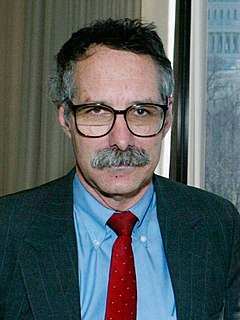A Quote by Ron Paul
From the Great Depression, to the stagflation of the seventies, to the current economic crisis caused by the housing bubble, every economic downturn suffered by this country over the past century can be traced to Federal Reserve policy. The Fed has followed a consistent policy of flooding the economy with easy money, leading to a misallocation of resources and an artificial 'boom' followed by a recession or depression when the Fed-created bubble bursts.
Quote Topics
Artificial
Boom
Bubble
Caused
Century
Consistent
Country
Created
Crisis
Current
Depression
Downturn
Easy
Easy Money
Economic
Economic Crisis
Economic Downturn
Economy
Every
Fed
Federal
Federal Reserve
Flooding
Followed
Great
Great Depression
Housing
Housing Bubble
Leading
Money
Over
Over The Past
Past
Policy
Recession
Reserve
Resources
Seventies
Suffered
Related Quotes
Housing has always been a key to Great Resets. During the Great Depression and New Deal, the federal government created a new system of housing finance to usher in the era of suburbanization. We need an even more radical shift in housing today. Housing has consumed too much of our economic resources and distorted the economy. It has trapped people who are underwater on their mortgages or can't sell their homes. And in doing so has left the labor market unable to flexibly adjust to new economic realities.
Too-easy credit and millions of bad loans made during the U.S. housing bubble paved the way for the financial calamity and Great Recession that followed. Today, by contrast, credit is too tight. Mortgage loans are particularly hard to get, creating a problem for the housing market and the broader economy.
I've always believed that a speculative bubble need not lead to a recession, as long as interest rates are cut quickly enough to stimulate alternative investments. But I had to face the fact that speculative bubbles usually are followed by recessions. My excuse has been that this was because the policy makers moved too slowly - that central banks were typically too slow to cut interest rates in the face of a burst bubble, giving the downturn time to build up a lot of momentum.
The Depression, which started in 1929 was rather mild from 1929 to 1930. And, indeed, in my opinion would have been over in 1931 at the latest had it not been that the Federal Reserve followed a policy which led to bank failures, widespread bank failures, and led to a reduction in the quantity of money.
Negative effects on the economy were covered up with a flood of liquidity from the Fed. That,plus lax regulation, led to a housing bubble, a consumption boom - but we were living on borrowed money. It was inevitable that there would be a day of reckoning, and it has now come. We will be paying the costs "with interest".
The Federal Reserve is the overlord of the money supply. If these two are not steering in the same direction, they can either neutralize each other or have the economy lurching in all directions. This is not a rational system for setting economic policy. It has given us trouble in the past, as the text will establish, and will inevitably in the future.
One intriguing subplot of the economic crisis is the failure of most economists to predict it. Here we have the most spectacular economic and financial crisis in decades - possibly since the Great Depression - and the one group that spends most of its waking hours analyzing the economy basically missed it.
There is a myth that the New Deal programs on their own pulled the US out of the Great Depression and created the conditions for the economic boom after World War II. As an economist, I can tell you, that is not true. In reality, it was mainly World War II that launched the boom - the massive war mobilization, the horrifying destruction and death caused by it, and then the reconstruction in its aftermath. he US was the only advanced capitalist country that was not bombed during the war.
































